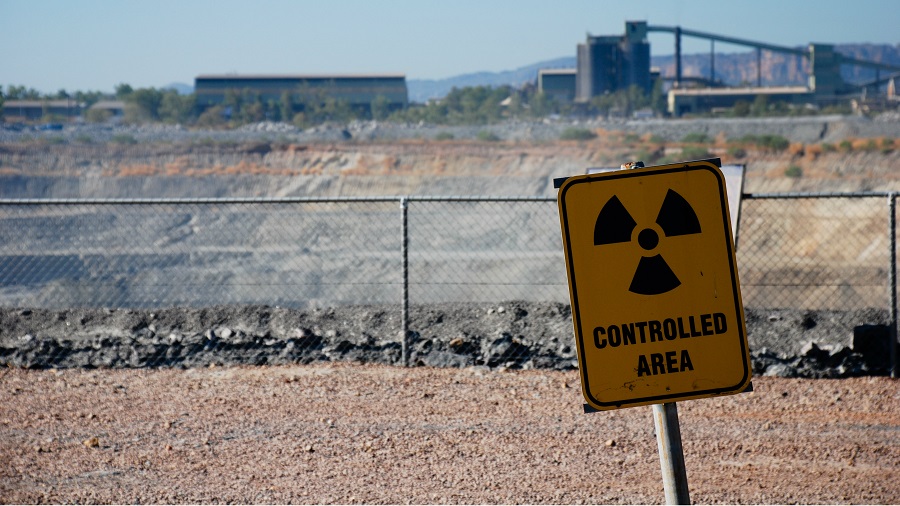The world’s largest uranium producer may suspend the export of uranium to the U.S. if a probe, prompted by a petition filed by two American uranium mining companies, gains traction.
Earlier this month, U.S. Commerce Secretary Wilbur Ross launched an investigation into uranium imports, after U.S. mining companies, namely Ur-Energy Inc. and Energy Fuels Inc., said subsidized foreign competitors have caused them to cut capacity and lay off workers.
“The Department of Commerce’s Bureau of Industry and Security will conduct a thorough, fair, and transparent review to determine whether uranium imports threaten to impair national security,” Ross said on July 18, according to reports by Reuters.
The companies are proposing that the U.S. limit uranium imports, citing national security concerns, by introducing a quota that will reserve 25 percent of the U.S. market for domestic producers, forcing federal energy companies and agencies to purchase American uranium in accordance with the “Buy American, Hire American” executive order that President Trump had signed in early 2017.
The U.S. uses uranium for its nuclear arsenal, nuclear-powered aircraft carriers and submarines, as well as nearly 100 commercial nuclear reactors throughout the country that produce 20 percent of the electricity consumed in the country.
The U.S. had been the world’s leading producer of uranium from 1953 until 1980, but now domestic uranium producers provide only about seven percent of domestic consumption due to high costs.
Kazakhstan is considered the second-largest uranium supplier to the U.S. after Canada, according to the U.S. Energy Information Administration. Canada leads the list of uranium suppliers with a 25 percent share, while Kazakhstan accounts for 24 percent.
Central Asia’s largest country has about 13 percent of the world’s recoverable uranium resources, with 50 known deposits and 19 uranium mines – six of which are operated by state-owned Kazatomprom. The remaining 13 are being developed through joint ventures. Most of the country’s uranium reserves can be extracted by the environmentally friendly and low-cost method called underground leaching.
Since Kazakhstan does not have its own nuclear power generation facilities, its uranium is fully exported and sold as raw material, namely uranium dioxide – a black, radioactive, crystalline powder. Along with the U.S., the list of importers of Kazakhstani uranium includes China, France, India, Canada and Ukraine.
Some experts believe that even if the Washington-led investigation grants protections to American uranium companies, Kazakhstan will not suffer economically.
“Sure, the profitability of production will decrease, but for Kazakhstan, given the very low cost of production, this decrease will be insignificant. In addition, Kazatomprom has quite stable positions in a number of countries in South-East Asia,” Sergey Smirnov, an independent expert from Kazakhstan wrote on July 20, according to informburo.kz.
The U.S. administration has been considering the possibility of applying protectionist measures for domestic uranium producers since late June, when U.S. Senator Mike Enzi (R-WY) pressed Secretary Ross to immediately initiate an investigation. Enzi said that “America’s continued reliance on foreign uranium could threaten the nation’s ability to maintain nuclear weapons and put large parts of the power grid under the indirect influence of foreign powers.”
But not everyone agrees.
Some believe that the American nuclear power industry is unable to provide the country with its own uranium. To increase the share in its own market, U.S. uranium producers need both time and investment. Edwin Lyman, a nuclear proliferation expert at the Union of Concerned Scientists believes the national security argument is ridiculous.
“Ill-advised policies such as bolstering the floundering nuclear industry by declaring it a national security asset is just taking us in the wrong direction as far as having a sensible energy policy,” Lyman told Washington Post on July 18.







 Russian peacekeeping forces, deployed in the Karabakh (Garabagh) region of Azerbaijan since 2020, have commenced their withdrawal from the area.
Russian peacekeeping forces, deployed in the Karabakh (Garabagh) region of Azerbaijan since 2020, have commenced their withdrawal from the area.
 Azerbaijan officially unveiled the logo for the upcoming 29th session of the Conference of the Parties to the United Nations Framework Convention o...
Azerbaijan officially unveiled the logo for the upcoming 29th session of the Conference of the Parties to the United Nations Framework Convention o...
 Iranian President Ebrahim Raisi warned Israel that it would face a "real and extensive" response if it makes any "mistake" following Tehran’s missi...
Iranian President Ebrahim Raisi warned Israel that it would face a "real and extensive" response if it makes any "mistake" following Tehran’s missi...



